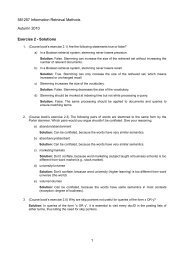Toni Sihvonen (order #92780) 62.142.248.1
Toni Sihvonen (order #92780) 62.142.248.1
Toni Sihvonen (order #92780) 62.142.248.1
Create successful ePaper yourself
Turn your PDF publications into a flip-book with our unique Google optimized e-Paper software.
<strong>Toni</strong> <strong>Sihvonen</strong> (<strong>order</strong> <strong>#92780</strong>) 6<br />
off your finger owes you l/lOth wergild or less: for a<br />
limb, the price might be six healsfangs (60% of wergild)<br />
or more. Stolen property is usually not worth more than<br />
six healsfangs, or its exchange value, whichever is greater.<br />
Your liege and your cynn can collect wergild on your<br />
behalf. Your cynn are also collectively liable for wergild<br />
fines you incur, unless they renounce you (below).<br />
If you are somebody’s legal ward - a child under seventeen,<br />
an unmarried daughter, a wife, a hostage, a heorthgeneat<br />
- you have no inherent wergild. To give testimony<br />
in court, you must use your guardian’s wergild or,<br />
better, let him speak for you. For compensation, your<br />
wergild equals your guardian’s - or double that if you<br />
are female or underage - and is your guardian’s to claim.<br />
A gerefa has his own wergild, but may use his cyning’s<br />
wergild while doing the cyning’s business. [Wergilds:<br />
page 1291<br />
Did the Saxons obey their own laws?<br />
Like most barbarians, the Saxons used “compensation” laws<br />
to limit vendettas. Like most barbarians, their sagas and<br />
chronicles are nonetheless full of bloody vendettas. One can<br />
dismiss these as amusing or cautionary legends; still,<br />
instances of barbarian laws enforced with a happy outcome,<br />
or of barbarians restraining their behavior for fear of the<br />
law, are hard to find. Players should remember that right<br />
and wrong in these societies was decided by which side<br />
brought more resources to a suit. that there were no police<br />
to enforce such decisions, that the rich could buy justice and<br />
khe well-armed could ignore it, and that by our standards a<br />
5igh level of violence was openly tolerated.<br />
On the other hand, Saxon legal decisions were sacred rituals.<br />
Witnesses put their hands on a holy thing (an altar to<br />
Wotan or Tiw: later on, a Bible), forfeiting their souls as<br />
well as their wergilds if they lied. One Saxon lawbook calls<br />
perjury a sin, equal to murder, sorcery, and incest. The stories<br />
that seem to treat vendettas lightly also display a real<br />
dread of bootless crimes and of the ultimate Saxon punishment:<br />
being renounced or outlawed as a nithing.<br />
Literate Saxon cynings had their laws copied and distributed<br />
to every ealdorman, thegn, and (later) abbot in their lands,<br />
reflecting a Saxon expectation that each of these men<br />
should know the law and uphold it among his followers.<br />
That expectation applies to Saxon characters in Pendragon.<br />
Player thegns and ealdormen should know their own cyning’s<br />
laws. They should also consider the advice of a later<br />
Saxon cyning, Alfred the Great: “Do not judge one judgment<br />
for the rich and another for the poor; nor one for the<br />
more dear and another for the more hateful . . . A man can<br />
think on this one sentence alone, that he judges each one<br />
rightly: he has need of no other law-books.”<br />
Boot Crimes<br />
There are two levels of pardonable crime: those for<br />
which the accusers must accept a wergild payment or<br />
other fine, and those for which the accusers can refuse it.<br />
If accusers accept payment whether by choice or by custom,<br />
they have settled the case and may take no<br />
vengeance. If they legally refuse payment, or if the lawbreaker<br />
does not pay promptly (for violent death, the<br />
offender must pay 20s at the funeral and the balance<br />
within forty days: lesser crimes might have twenty days’<br />
grace), then the accusers can pursue vengeful mayhem<br />
against the lawbreaker’s cynn up to the level of the<br />
wergild refused.<br />
Accusers must accept wergild for persons killed in war or<br />
other cyning-sanctioned combat, or in defense of self,<br />
others, or property, or by accident. They must accept it<br />
for petty theft and for goods illegally seized in a property<br />
dispute, from a trader who sold them stolen goods or<br />
who sold a weapon to a murderer, and for other kinds of<br />
minor or unintentional property damage. They must<br />
accept it for the battery or rape of their ceorls or other<br />
servants (“rape” in this sense means unauthorized sex; the<br />
woman may or may not have consented). They can pursue<br />
a feud only if the fine is not paid.<br />
Accusers have the option to accept or refuse wergild for<br />
deliberate, unsanctioned killing, major property crimes,<br />
and battery or rape against their guests, hosts, or cynn.<br />
Cattle theft, which is epidemic among Saxons and freely<br />
practiced against Britons, is theoretically in this category,<br />
but byrde can often raid the cattle of lesser men on the<br />
pretext that they are collecting delinquent feorm,<br />
wergilds, or supplies needed for a campaign. Accusers<br />
who refuse wergild for these crimes are signaling the start<br />
of a blood feud.<br />
Wergild and vengeance are family obligations. It is the<br />
gravest dishonor to let a cynnsman lie unavenged. Failure<br />
to pursue wergild (one way or another) reduces your<br />
Honor and Love: Family. [fines: page 129. New Trait and<br />
Passion Rules - Failure to Collect Wergild page 1231<br />
Bootless Crimes<br />
Beyond ordinary standards of compensation are bootless<br />
(“unpardonable”) crimes against cynn and theod.<br />
Fighting over goods or grievances is part of public life, but<br />
some men steal goods by sneaking into another’s house,<br />
or murder their enemies by ambush and then hide the<br />
bodies. Others carry a woman away from her father’s<br />
house by night, or kill with poison, arson, or sorcery, or
















